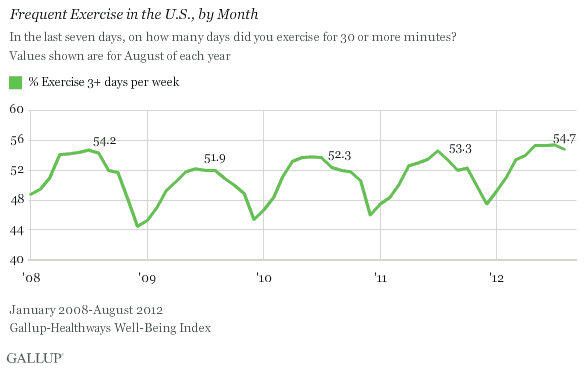Category: Exercise
Poll: Frequent Exercise Slightly Up in 2012
Posted onGood news regarding exercise, in light of the report on obesity that was released the other day.
More Americans exercised frequently in August (54.7%) than did in the same month in past years — continuing a pattern Gallup and Healthways have found through most of 2012. In every month this year, except for April, more Americans reported exercising three or more days per week than did so in the same month for each of the past four years.
Gallup and Healthways ask 1,000 American adults daily about their exercise habits as part of the Gallup-Healthways Well-Being Index. Specifically, Americans report how many days in the past seven they exercised for at least 30 minutes.
The uptick in frequent exercise this year has come amid “the warmest first eight months of any year on record” in the U.S., according to the National Oceanic and Atmospheric Administration. Whether there is a direct relationship between these warm temperatures and higher exercise levels — or it is mere coincidence — is not certain.
However, that Americans’ exercise habits are seasonal — they work out more in the spring and summer months and less in the fall and winter — points to the weather playing a role in their likelihood of exercising.
Good job, America!
And, while this slight increase may be seasonal and related to the weather, it is also possible that educational efforts promoting a healthy lifestyle may be having an effect.
Why It Is Important to Stay Moving – Blood Sugar Levels
Posted on
Finishing the Disneyland Half Marathon last summer
Hoping to learn more about how inactivity affects disease risk, researchers at the University of Missouri recently persuaded a group of healthy, active young adults to stop moving around so much. Scientists have known for some time that sedentary people are at increased risk of developing heart disease and Type 2 diabetes. But they haven’t fully understood why, in part because studying the effects of sedentary behavior isn’t easy. People who are inactive may also be obese, eat poorly or face other lifestyle or metabolic issues that make it impossible to tease out the specific role that inactivity, on its own, plays in ill health.
So, to combat the problem, researchers lately have embraced a novel approach to studying the effects of inactivity. They’ve imposed the condition on people who otherwise would be out happily exercising and moving about, in some cases by sentencing them to bed rest.
But in the current study, which was published this month in Medicine & Science in Sports & Exercise, the scientists created a more realistic version of inactivity by having their volunteers cut the number of steps they took each day by at least half.
Read all of the piece.
And, keep moving……
A 7 mile easy run tomorrow in tapering mode for the Los Angeles Marathon on March 18th.
Exercise To Prevent Alzheimer’s Disease?
Posted on
Here I am running down the Santa Monica Pier
Alzheimer’s disease, with its inexorable loss of memory and self, understandably alarms most of us. This is especially so since, at the moment, there are no cures for the condition and few promising drug treatments. But a cautiously encouraging new study from The Archives of Neurology suggests that for some people, a daily walk or jog could alter the risk of developing Alzheimer’s or change the course of the disease if it begins.
For the experiment, researchers at Washington University in St. Louis recruited 201 adults, ages 45 to 88, who were part of a continuing study at the university’s Knight Alzheimer’s Disease Research Center. Some of the participants had a family history of Alzheimer’s, but none, as the study began, showed clinical symptoms of the disease. They performed well on tests of memory and thinking. “They were, as far as we could determine, cognitively normal,” says Denise Head, an associate professor of psychology at Washington University who led the study.
All of those “LONG” runs, don’t see as arduous now!
In any case, there are many benefits of exercise and this may be just one of them.
The Fat Trap and Why Lost Pounds Come Back
Posted on
Here I am running up the Santa Monica Pier
Tara Parker-Pope has an interesting piece in the New York Times exploring obesity, and weight loss.
In this week’s New York Times Magazine, I explore new research that helps explain why most dieters who lose weight end up gaining it all back.
“If anything, the emerging science of weight loss teaches us that perhaps we should rethink our biases about people who are overweight. It is true that people who are overweight, including myself, get that way because they eat too many calories relative to what their bodies need. But a number of biological and genetic factors can play a role in determining exactly how much food is too much for any given individual. Clearly, weight loss is an intense struggle, one in which we are not fighting simply hunger or cravings for sweets, but our own bodies….”
Read it all and especially the comments about others’ personal stories of weight loss trials and tribulations.
There is a critic of her New York Magazine piece over at the Atlantic and I agree – albeit somewhat.
I’m not a scientist, but I have lost roughly a quarter of myself. I’ve done it at a glacial pace–almost eight years. So glacial in fact that I wouldn’t even call it a “diet.”: I’ve gained some in that time, but never yo-yoed back to the heights of my girth. The pattern has been more like lose lot, gain a some, lose some gain a little, lose a lot etc.
Obviously I wish this had happened faster and smoother. But the upshot of taking the long way is that I’ve learned a lot about how to negotiate world where, at almost every step, cheap high calorie food is at the ready. You can’t get that understanding in a lab and you’re unlikely to get if your trying to burn of 3-4 pounds a week. That sounds like masochism.
I, now weigh 233 pounds, on my way down to 180 (I am 5-11). 9 years ago I weighed as much as 370 pounds.
Exercise, diet and accountability to myself and others (spouse and friends) have all helped.
It has been a lifestyle change.
There will be NO relapse – after all it is MY health at stake.


